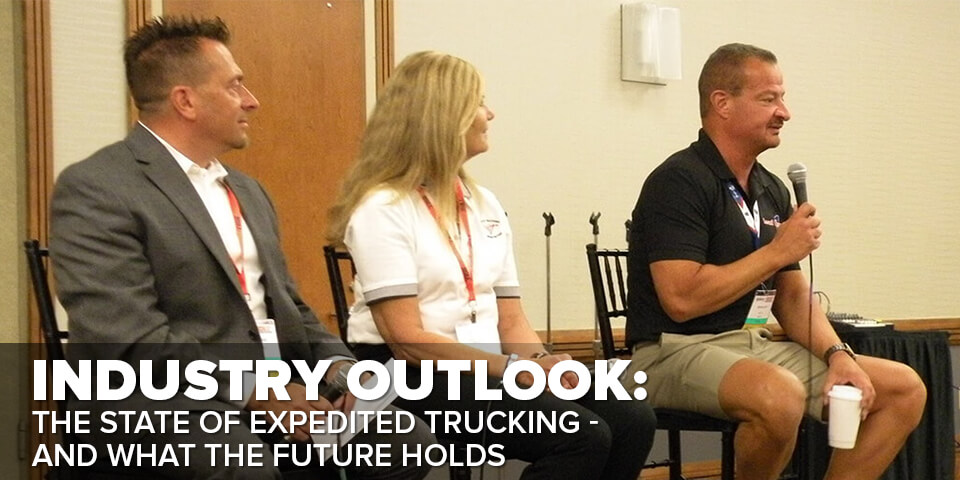In The News

Industry Outlook: The State of Expedited Trucking—and What the Future Holds
What exactly is the state of the expedited trucking industry today? Where is the industry headed? What technologies will most likely disrupt the market? What are the key trends to watch that could impact your business?
These are some of the questions that industry experts addressed to a packed house of owner-operators, drivers, and fleet owners on the final day of Expedite Expo 2019 at the Allen County War Memorial Coliseum in Ft. Wayne, Indiana.
The 10 a.m. special event on “The State of Expedited Trucking” was moderated by Sean Lyden with ExpeditersOnline.com and featured panelists who offered unique perspectives on the industry, including:
- John Elliott, chief executive officer for Load One LLC, an expedited trucking carrier headquartered in Taylor, Mich.
- Ellen Voie, president and chief executive officer of Women in Trucking, a national organization that encourages the employment of women in the trucking industry
- Mike Abood, managing director of operations at FedEx Custom Critical.
Here are edited highlights from the conversation.
On the state of the expedite industry...
John Elliott: Right now, a lot of companies are struggling. We've seen a lot of small carriers go under or shut their doors, especially in the expedite industry because there are a lot of small ones. They don't get a lot of press because they're not that big.
But we're already seeing a little stronger numbers. Going into July, we saw an improving June. And overall, I think things are going to continue to get better, but it's not last year.
Well-managed, stronger carriers will do well. [At Load One], we look at this market as an opportunity. I know most carriers are cutting staff right now, literally trying to scale down hard. But by the time this year is over, we'll probably increase our sales staff by 50%.
Mike Abood: Overall, I would agree that the expedite market is a little cloudy right now.
But there are some bright spots. [At FedEx Custom Critical], we have a fairly robust temp control division. And 95% of their volume is done handling pharmaceuticals or biologics—a business that tends to be recession-proof that runs like clockwork.
So, our temp control business is looking very robust at this point. We plan to grow that capacity significantly during the year, and I don't see that changing in the coming years.
On the growth of women in the industry…
Ellen Voie: Our biggest hurdle is that women don't consider a career in trucking unless somebody says, “Hey, have you thought about this?”
So, as women who bring a different perspective to the industry, you are very valuable. My job is to go out to other women and say, "You can do this. Look at these successful, happy women." And then go to the carriers and say, "This is why you want to hire women."
Mike Abood: When I look at the makeup of the Custom Critical fleet, right now, more than 28% of our drivers are women. About 28% of owner-operators are women. And then the other category is owner-only—which means they don't drive, they just own the trucks—and about 50% of our owners-only are women.
So [the growth of women in the industry] is definitely something that we see.
On the potential impact of self-driving trucks…
John Elliott: For anyone afraid of the autonomous thing, here's what I would tell you: Is the railroad autonomous?
No.
[The railroad] is the safest controlled environment you can have in transportation, and you don't see it. But I would be much more comfortable with a train going by with nobody in it than I would be with the truck driving next to my family relying on automation.
And then there are huge legal things that need to be figured out. When the accident does happen—which is going to happen—is that the [vehicle] manufacturer’s fault? Is it the sensor manufacturer's fault? Is it the software company's fault?
These legal issues are going to need to be figured out. And we know the pace that Washington, DC, moves. [Self-driving trucks] is nothing to fear in the short term.
Mike Abood: I completely agree. If we see a surge in the autonomous vehicles in my lifetime, I'd be surprised.
On the technology most likely to disrupt the industry...
Ellen Voie: What I think is going to be the biggest disruptor in [the expedite] industry is 3D printing. That’s because for a part you need to get in three hours to GM in the future, they might be able to say, “Let’s print this part out. We don’t need transportation.” So, I think the biggest disruptor is going to be 3D printing. But I’m not sure to what extent that will be.
John Elliott: I agree. 3D printing will impact this industry, but I don’t think it’s going to happen as fast. It can do a lot of things. But for vehicles and things like that, those parts have to meet certain safety standards and certifications that 3D printed parts potentially can’t meet. But long term, I think 3D printing will make an impact.
Mike Abood: 3D printing is still very expensive. So it may be a while for individual manufacturers to print their own parts. But you will likely see, instead, regional warehouses where the cost of 3D printers can be spread across multiple companies. And this could disrupt the supply chain.
So, instead of having to travel across the country to get a part, you might be able to get a 3D printed part within a region of 300 to 500 miles.
